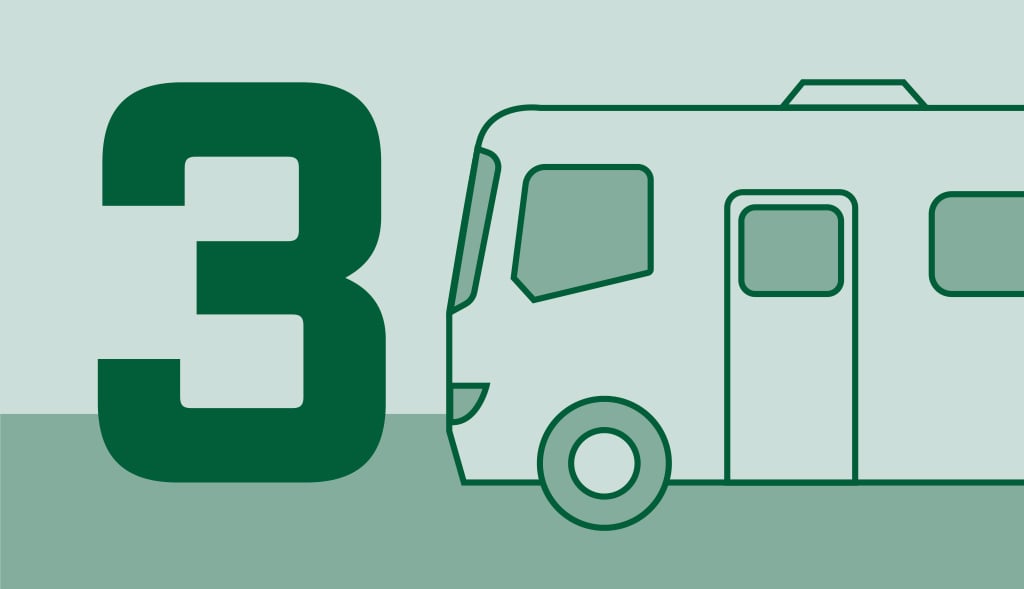Your Ultimate RV Maintenance Checklist

Properly maintaining your RV will help it look and run efficiently now and in the future. Ongoing maintenance can also help you avoid more expensive issues down the road.
Unfortunately, if you neglect proper RV maintenance, you may experience an array of expensive problems. Now is the time to learn how to properly maintain your RV and ensure that no serious issues arise.
Many parts of your RV require ongoing care and maintenance from the water heater to the tires and exterior. Learn more about these here.
Roof Maintenance
For many RV owners, the most neglected part is the roof. Modern RVs have one of three basic types of roofs: aluminum, fiberglass, and rubber.
Aluminum and fiberglass roofs are considered low maintenance. However, many of today’s RVs have rubber roofs. While these are effective, they require ongoing maintenance during the year.
How much maintenance required depends on several factors, including:
- The age of the roof
- The weather
- If you keep the RV covered
Rubber roofing systems are made from either TPO or EPDM. This means the chemicals you can use for cleaning the roof vary based on the material.
Even though there isn’t a specific interval to maintain your roof, you need to check it every few months. If you have an RV that is more than 10 years old, checking it more often is recommended. If you fail to do this, it may result in mold, rotting wood, electrical damage, and leaks.
When inspecting your roof, there are a few specific things you need to look for. These include:
The Presence of Cracks
Rubberized roofs are prone to cracking. Usually, these cracks will appear around the ladder, AC units, antennas, and vents. To check for cracks, climb up the rear ladder and move from the front of the RV to the back.
If cracks are found, clean the area well with a rubber roof cleaner. Once clean, apply a specialty RV rubber roof sealant using a caulk gun. Be sure to check your manual to see what type of sealant you should use because there are two options.
Clean the Roof
Dirt, dust, bugs, leaves, and limbs can accumulate and build up on your RV’s roof. Unlike your home’s roof, there is no slant to help gravity push these items off. If you don’t remove this buildup, it can cause damage and eventually leaks.
The amount of buildup will depend on a few factors. For example, if you park your RV under a tree or live in a location where there is a lot of dust, it may be necessary to clean the RV’s roof weekly.
To do this, use a standard broom. Just use caution as you clean around AC units. You can also clean the roof with a specialized roof cleaner, just make sure you choose the right one.
Coat Using a UV Protectant
The sun’s rays may wear down the roof on your RV, causing it to dry out, crumble, and crack. You can prevent this by applying a UV protectant.
RV Finish and Paint Maintenance
Taking steps to maintain the finish on the outside of your RV will keep it looking great. While it may be a lot of work, it is worth taking preventative steps to ensure the elements do not damage the finish.
After damage has occurred, it is expensive and time consuming to repair it. That’s why preventing these issues is so important.
Wash the RV
Keeping the exterior of your RV clean is essential. Washing it every few months will be enough. If you live in a dustier area or where your RV is exposed to more debris, washing it more often will be necessary.
Wax or Seal the Finish
Once your RV is clean, use a sealant and wax to protect the finish from debris and exposure to the sun. Wax will protect for around two to three months. Sealants can provide six to seven months of protection.
Cover When in Storage
Make sure you store your RV under an awning or cover. This will help protect it from dirt, UV rays, and other debris. If you plan to store the RV for several months, make sure it isn’t left in the direct sunlight.
Interior Component Maintenance
There are many interior components in your RV that require regular and ongoing maintenance. Learn more about each of these here.
Water Heater Maintenance
While RV water heater maintenance is pretty straightforward, you should still use caution. Most units use LP gas and electricity, so make sure you turn off the electricity and turn off the HW heater breaker and the power switch. Turn the power and gas switches to the LP gas cylinders off, too.
The next step is to remove the anode rod. If the anode is rusted in place, you may need a torque wrench to remove it.
Make sure you have something under the water heater to catch the water that will come out. If the anode has been in for a while and the RV is used often, it will likely look eaten away and corroded. This is a good thing because it means the rod is doing its job.
Once the tank is empty, get your freshwater hose and hook it up to a flushing wand. This will reach back into the tank and increase the water pressure. Continue the flushing process until there are no more calcified deposits or sediment coming out.
It is a good idea to check and replace your RV magnesium anode rod once yearly, or more if your RV is used often. Be sure to check the other components during your inspection to ensure everything continues working efficiently. If you would like to have a long term solution and stop changing the anode rod every year, you can replace it with a Corro-Protec powered anode rod. This device replaces the magnesium rod and it’s a long-term solution with a 20-year warranty.
If you ever notice something unusual, such as a smell of rotten eggs, installing a Corro-Protec would be the best solution. It will stop all smells within 24 hours or so.
AC Maintenance
The overhead AC in your RV keeps things dry and cool during the hotter months of the year. Keeping it well maintained can reduce the risk that it will just stop working when you need it.
The roof AC unit has two coils – evaporator and condenser coils. As air moves through these, pollen, dirt, and dust build up on them. This causes the AC to work harder than necessary, which also increases wear and tear.
Make sure to clean the coils once per year.
It is also necessary to clean the AC drain pans. These are designed to catch the moisture the AC removes. They may become clogged.
Along with dirt and grime building up in the drain pan, critters may make their nests here. This is another common cause of clogs. Be sure to clean these regularly.
RV Battery Maintenance
Almost everything in your RV needs electricity, which is provided by the battery. You have two basic types of batteries in your RV, the house batteries and chassis batteries.
Some tips for maintaining the RV battery system include the following.
Clean the Terminal Ends
You should deep clean the battery terminals each year. Dirt, rust, oil, and corrosion may build up on the ends of the terminals.
If buildup occurs, it can result in a poor connection, which may cause insufficient power or charging. If your battery does not charge fully, it will wear out quickly.
Another issue that may occur is that the buildup prevents a good connection, which may cause electrical arcing. This can cause the battery to explode, which will destroy any mechanical components nearby, and cause a bodily injury.
To clean the terminals, use hot water and baking soda and a wire brush. You can also purchase a battery terminal cleaning kit to make it easier. Once they are clean, rinse the terminals well with water and reattach the battery.
Replenish the Electrolyte for the Battery
If a battery is low on electrolytes, sulfation will begin. This can shorten the life of your battery.
It is a good idea to check the electrolyte levels in your battery monthly. If they are low or close to the metal plates, use distilled water to restore them.
Keep the Batteries Charged
No matter how well you maintain your RV batteries, they will eventually have to be replaced. Be sure to check their condition once per year to figure out if you should replace them. Low Amps and automatic battery charger is recommended.
Engine Maintenance
Just like with any vehicle, the engine and other mechanical components in your RV require regular maintenance. There are a few ways to maintain the engine in your RV.
Change the Oil
Keep this “to-do” at the top of your list. If you keep old or overused oil in your RV’s engine, it will reduce its lifespan. It will also reduce your gas mileage.
You can change the oil yourself or hire someone to do this. Even if you have your RV stored for most of the year, you need to change it once every 12 months. If you are a frequent traveler, choose a high-mileage oil.
Top Off the Fluids
Be sure to check your RV fluids before and after every trip and each month. Top these off as needed.
The fluids that you need to check regularly include:
- AC coolant
- Engine oil
- Windshield wiper fluid
- Brake fluid
- Power steering fluid
- Radiator fluid
- Transmission fluid
Besides the windshield wiper fluid, if you discover that the fluids need to be filled often, inspect the leak system.
Check for Any Signs of Wear
Along with topping off the fluid levels, you need to look over the engine compartment regularly. Make sure to watch for any signs of dirty filters, worn-out belts, and cracked hoses.
If you snap a belt while you are on the road, it may cause serious issues and dangerous driving conditions.
The Wheels
The wheels of your RV are the only part that touches the road. As a result, you need to ensure they are in good repair before you head out. Some of the things you need to check and keep track of are found here.
Top Off the Tire Pressure
Before each trip, stop to check the tire pressure. If your tires are low on air, it will make more contact with the road. This will cause heat to build up in your tire.
Overheating is the top cause of tire blowouts. If a blowout occurs, it can cause serious damage to the RV and even be deadly.
Rotate the Tires
Rotating the tires is essential to get the most life from them. With tire rotation, you are spreading the burden so that the tread will wear evenly.
Repair or Replace the Tires
Before heading out, you need to make sure your tires can make the journey. Check for any bulges, punctures, or wear. If you find problems, replace the tires before heading out.
Tighten the Lug Nuts
RV tires are held in place by lug nuts. Driving can cause these to loosen. You don’t want these to come off, so make sure to check them before heading out for a trip or adventure.
Don’t Skimp on RV Maintenance
When it comes to RV maintenance, you should never ignore or skimp on it. Doing so may put you or others in danger.
By using the tips and information here, you can feel confident that your RV will be ready for any adventure you want to go on. From the AC and water heater to the tires and engine, knowing how to maintain your RV properly will pay off in the long run.
If you want to ensure your RV is in roadworthy condition, be sure to maintain it through the year, even if it is in storage. This will pay off and help prevent a serious breakdown, which will likely be frustrating and expensive.
When you know what to do, you can keep your recreational vehicle in top-notch condition.





Yes, Corro-Protec offers RV anodes!
Properly maintaining your RV will help it look and run efficiently now and in the future. Ongoing maintenance can also help you avoid more expensive issues down the road.
Unfortunately, if you neglect proper RV maintenance, you may experience an array of expensive problems.
The RV water heater is one of them. If you would like to have a long-term solution and stop changing the anode rod every year, you can replace it with a Corro-Protec powered anode rod.
This device replaces the magnesium rod and it’s a long-term solution with a 20-year warranty. Install a Corro-Protec hot water RV anode NOW.
DISCLAIMER: The information provided is for general DIY guidance on water heater maintenance and does not replace professional advice or service. Risks include electric shocks, burns, and property damage. Prioritize safety, follow manufacturer’s guidelines, and consult with professionals if unsure. Comply with local laws and obtain necessary permits. Use this information at your own risk; the provider assumes no liability for any injuries or damages. If in doubt, hire a professional.
Blog
RV Water Heater : 3 Things I Wish Everyone Knew About
Just like your residential water heater, your RV water heater needs rust protection. This protection is normally provided by a magnesium anode already installed in […]
Stop Your RV Water From Smelling Like Rotten Eggs
The smell of rotten eggs in your RV water can be alarming and unpleasant. This common issue, often caused by hydrogen sulfide gas, must be […]

